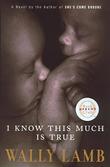One truth becomes clear as you read the 1998 bestseller I Know This Much Is True: Its author, Wally Lamb, really likes to torture his characters. Now viewers can watch that play out in a six-part HBO miniseries, premiering Sunday.
The book’s narrator, Dominick Birdsey, has seen all manner of tragedy. He lost his infant daughter, years ago, to sudden infant death syndrome; his wife, Dessa, left him shortly afterward. He doesn’t know who his own father was, and his stepfather, Ray, was an abusive idiot. His saintly mother died of cancer, leaving him to take care of his identical twin brother, Thomas, who struggles with paranoid schizophrenia and self-destructive tendencies. Later, Dominick’s girlfriend, Joy, gets pregnant by another man, and Dominick himself is terribly injured in a pickup-truck accident and a fall off a roof. Along the way, he reads the autobiography of his Italian immigrant grandfather, who, it turns out, was a horrible, evil person. As Dominick observes, late in the book: “What a fucked-up universe.”
Indeed, it’s the grimmest soap opera imaginable—one with no sense of fun, and pretensions toward literary greatness. This won’t surprise anyone who’s familiar with Lamb’s 1992 debut novel, She’s Come Undone, which also put its players through many, many trials and tribulations; it, too, featured mental illness, domestic abuse, divorce, self-harm, and more. One could almost call I Know This Much Is True an extended remix of that novel—and extended it is, at more than 900 pages in length.
 You’d think that Dominick would be a sympathetic character, given all that Lamb throws at him, but it turns out that he’s a pretty awful human being. As a child, he accuses a Native American classmate of theft, knowing full well that it’s a lie, and faces absolutely no repercussions; as a young man, he treats his mentally ill brother horribly and sees him as nothing but a burden; in middle age, he effectively forgives his loathsome stepfather—a man who once broke Dominick’s mother’s arm. The book gives all kinds of disgusting behavior a pass; for example, Dominick rapes Dessa when they’re still dating—a detail that’s notably missing from the miniseries version—and Lamb has Dessa forgive him. But many readers won’t, and, frankly, they shouldn’t.
You’d think that Dominick would be a sympathetic character, given all that Lamb throws at him, but it turns out that he’s a pretty awful human being. As a child, he accuses a Native American classmate of theft, knowing full well that it’s a lie, and faces absolutely no repercussions; as a young man, he treats his mentally ill brother horribly and sees him as nothing but a burden; in middle age, he effectively forgives his loathsome stepfather—a man who once broke Dominick’s mother’s arm. The book gives all kinds of disgusting behavior a pass; for example, Dominick rapes Dessa when they’re still dating—a detail that’s notably missing from the miniseries version—and Lamb has Dessa forgive him. But many readers won’t, and, frankly, they shouldn’t.
The HBO adaptation, ably directed by The Place Beyond the Pines’ Derek Cianfrance, gives the novel a prestige-TV treatment, and it’s largely faithful to Lamb’s vision, such as it is. Oscar nominee Mark Ruffalo does a fine job in the challenging dual role of Dominick and Thomas—helped along by impressive special effects—and one can easily imagine the actor seeing an Emmy (or Emmys?) in his future when he signed onto the project. It wouldn’t be undeserved, but one wishes that the miniseries focused less on his characters and gave the other actors a bit more to do. Oscar winner Melissa Leo, as Dominick and Thomas’ mother, is truly wasted in a tiny part. Kathryn Hahn, as Dessa, and Rosie O’Donnell, as Thomas’ social worker, don’t get the screen time that they deserve. Oscar nominee Juliette Lewis is riveting, as well—in the handful of scenes she gets in a blink-and-you-miss-it role. Instead, the miniseries, and the book on which it’s based, lavish attention on Dominick—a person who, quite honestly, doesn’t deserve it.
David Rapp is the senior Indie editor.



































